Weronika Murek | |
|---|---|
 | |
| Born | 1989 Bytom, Poland |
| Occupation | writer |
Weronika Murek (born 1989) is a Polish playwright, short story writer and essayist.
Weronika Murek | |
|---|---|
 | |
| Born | 1989 Bytom, Poland |
| Occupation | writer |
Weronika Murek (born 1989) is a Polish playwright, short story writer and essayist.
Weronika Murek was born in 1989, in Bytom. [1] She graduated from the Faculty of Law and Administration of the University of Silesia. [1]
Murek has written plays, short stories [2] and essays. [3] She won the Gdynia Drama Award 2015 for the play Feinweinblein set in the 1950s Upper Silesia. [1] Her debut collection of short stories Uprawa roślin południowych metodą Miczurina was nominated for the Paszport Polityki 2015 in the literature category, the Nike Award 2016, [4] the Gdynia Literary Prize 2016 [4] and the Conrad Award 2016. [5] The collection won the Witold Gombrowicz literary award in 2016. [4] Murek gained her second Paszport Polityki nomination with the 2019 collection of plays called Feinweinblein. [2]
Apart from writing her own plays, Murek has also worked on adaptating the work of others to the stage. [2] For example, she cooperated with Grzegorz Jarzyna to adapt a work by Lu Xun or create together a new production of The Tempest . [2]
Murek's works have been translated into Czech, French, Serbian and Hungarian. [4] An excerpt from her short story collection was published in English on the European Literature Network website. [6]

Andrzej Sapkowski is a Polish fantasy writer, essayist, translator and a trained economist. He is best known for his six-volume series of books The Witcher, which revolves around the eponymous "witcher," a monster-hunter, Geralt of Rivia. It began with the publication of Last Wish (1990), and was completed with the publication of standalone prequel novel Season of Storms (2013). The saga has been popularized through television, stage, comic books, video games and translated into 37 languages making him the second most-translated Polish science fiction and fantasy writer after Stanisław Lem.

Rafał Aleksander Ziemkiewicz is a Polish political and science fiction author and right-wing publicist. Winner of the Janusz A. Zajdel Award.
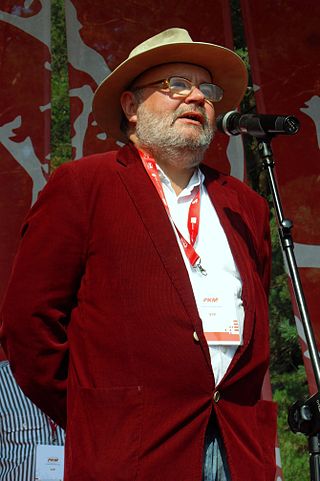
Paweł Marek Huelle was a Polish prose writer.

Michał Witkowski is a Polish novelist.

Jerzy Oskar Stuhr was a Polish film and theatre actor. Considered one of the most popular, influential and versatile Polish actors and an icon of Polish cinema, he also worked as a screenwriter, film director, voice actor and drama professor. He served as the rector of the Ludwik Solski Academy for the Dramatic Arts in Kraków for two terms: from 1990 to 1996 and again from 2002 to 2008.

Jacek Maria Dehnel is a Polish poet, writer, translator and painter.
Paszport Polityki is an annual Polish cultural award presented by the weekly magazine Polityka since 1993.
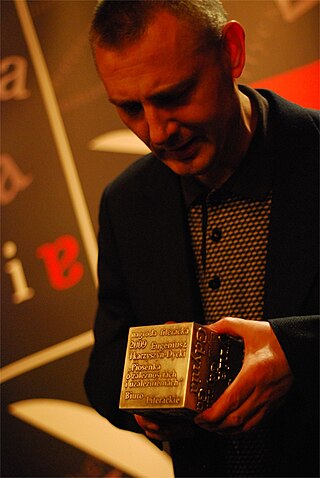
Eugeniusz Tkaczyszyn-Dycki is a Polish poet.
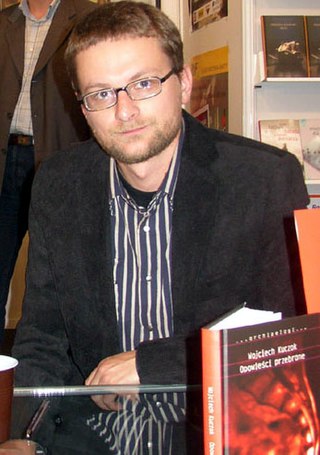
Wojciech Kuczok is a Polish novelist, poet, screenwriter, film critic and speleologist.
MaMiKo is a Polish publisher located in Nowa Ruda, a medieval town. The town has a strong literary tradition, and hosts the “Góry Literatury” annually.

Maja Ostaszewska is a Polish actress. She made her screen debut appearing in small role in the 1993 historical drama film Schindler's List, before playing leading role in the drama film The Haven (1998), for which she received Polish Film Festival Award for Best Actress. She received her second Polish Film Festival Award for Best Actress for Prymas – trzy lata z tysiąca (2000). Since then, Ostaszewska appeared in more than 30 motion pictures and received six Polish Academy Award for Best Actress nominations, winning twice: for Jack Strong (2014) and Body (2015).

Borys Lankosz is a Polish film director.
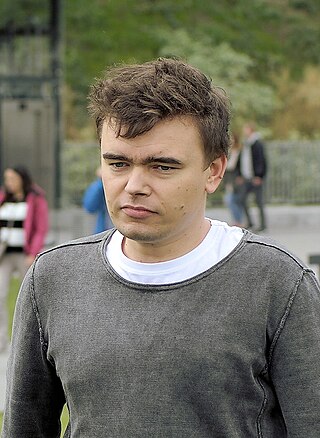
Jan Paweł Matuszyński is a Polish film director and a producer of documentary films.
Mateusz Pacewicz is a Polish award-winning screenwriter and film director.
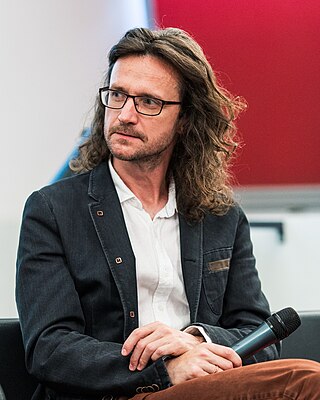
Maciej Płaza is a Polish writer, literary scholar and translator of English literature.

Szczepan Lech Twardoch is a Polish-Silesian writer. He has written a series of best-selling novels such as Morphine (2012), Drach (2014), The King (2016), The Kingdom (2018), and Pokora (2020).
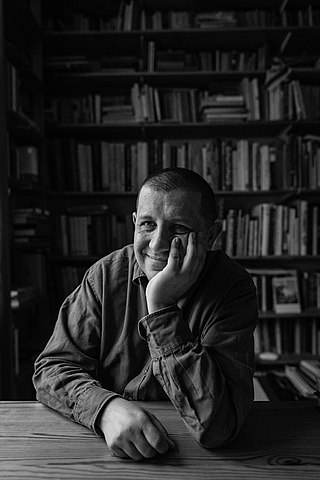
Marcin Wicha is a Polish graphic designer, children's author, and essayist.

Marek Bieńczyk is a Polish writer, historian of literature, translator, essayist and oenologist. In 2012, he won the Nike Award, Poland's top literary prize, for his collection of essays Book of Faces.

Dominika Słowik is a Polish writer. Her novel Zimowla brought her the Paszport Polityki 2019 award.

Olga Drenda is a Polish anthropologist, cultural historian, translator, writer and author. She has an interest in popular culture, and everyday life and objects from late 20th century Poland covering the period of the Polish People's Republic to the transition from communism.